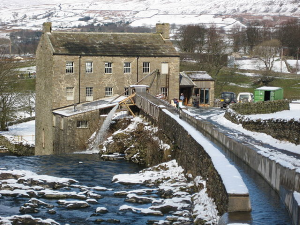 The historic Gayle Mill is to develop its role in demonstrating the decarbonisation of old buildings, thanks to grant funding, reports the Darlington and Stockton Times.
The historic Gayle Mill is to develop its role in demonstrating the decarbonisation of old buildings, thanks to grant funding, reports the Darlington and Stockton Times.
image: Gayle Mill, Yorkshire by Lobsan – Own work, CC BY-SA 3.0, https://commons.wikimedia.org/w/index.php?curid=24738679
… enabling Cultura Trust to undertake an audit of the mill’s carbon footprint and identify ways it can be improved…
Darlington and Stockton Times writes:
The project has secured £6,000 from the Yorkshire Dales National Park Authority’s Sustainable Development Fund and £1,000 from Historic England. The money will help towards enabling Cultura Trust to undertake an audit of the mill’s carbon footprint and identify ways it can be improved.
The project will include public talks on how historic buildings around the Yorkshire Dales can contribute to the COP26 response to climate action.
Graham Bell, director of Cultura, said: “Concerns about climate change often feel quite remote; we see changes in the weather in the Dales but can’t see how we can help make things better.
“Historic buildings can be seen as out of date – cold and damp, costly to heat. How can we square the circle of keeping the special character of the Dales but do our bit? By doing a test study on the mill, which has been at the forefront of renewable energy since 1784, we can find out.”
Stuart Parsons, Cultura’s mill manager, is particularly keen to share lessons learned. “Successive generations of people have made this mill special in the lives and economy of the upper Dales,” he said.
“Maintaining sustainability with the environment is a tradition we need to keep up more than ever, so where better to show it than here?”
The study and talks will take place up to Easter and are part of Cultura’s programme of public activities based at Gayle Mill, supported by the Peter Sowerby Foundation.
The mill, near Hawes in Wensleydale, dates from 1784, working for more than 200 years as an outstanding example of the UK’s industrial evolution. It closed in 1988 but re-opened 20 years later, preserved and fully operational.

